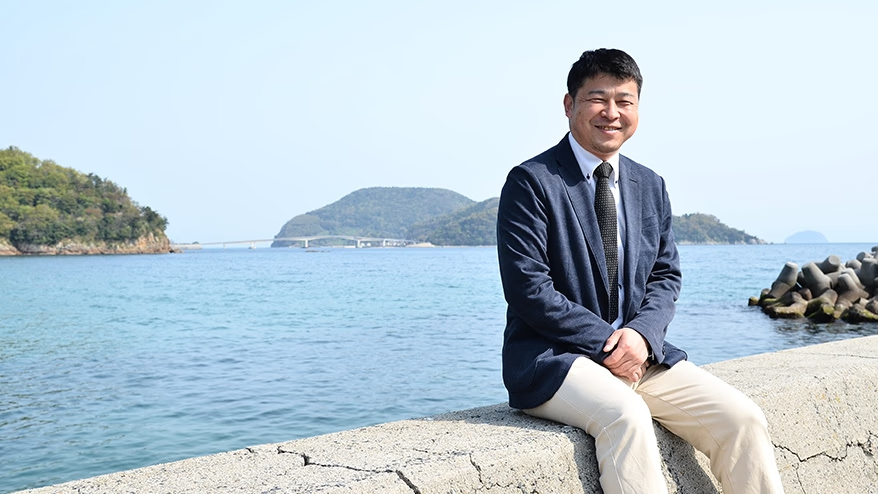モノサスとつながる方々それぞれの「ものさし」をインタビューしている当コーナー「めぐるモノサシ」。今回登場するのは、西村一樹さんです。
山口県の東端に位置する周防大島町は、本土と大島大橋で結ばれた瀬戸内海の島。最大時は約65,000人が暮らしたと言われていますが、現在の人口は1万7000人ほど。西村さんは島の漁師の網元の家で生まれ育ち、周防大島町役場で、周防大島への定住を考える人たちをサポートするお仕事をされています。
もちろん、副社長の永井も移住する際にお世話になっており、今や役場の担当者、移住者の枠を越え、すっかり飲み仲間となっているとか。弊社の5つ目の拠点となった周防大島サテライトオフィスの開所式の司会進行まで務めていただくなど、モノサスと深く関わってくださっています。
今回はそんな2人の対談から、移住者、定住者を求める地元の想い、移住者、定住者の本音、そして、役場の一担当者以上の奮闘をする西村さんの「ものさし」が見えてきました。前後編の前編からお届けします。
(インタビュー構成:佐口賢作)
-
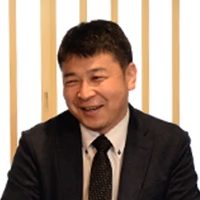
-
西村一樹さんプロフィール:
1974年山口県周防大島町生まれ。山口県周防大島町役場職員。1998年役場入庁。2014年から周防大島町の移住担当に配属され東京や大阪で開催される移住イベントに参加するとともに、周防大島町を訪れる移住希望者の相談業務を主な仕事のひとつとしている。周防大島は暮らすのに良いところ。心地よい不便さも良いところです!
周防大島ではなくとも、山口に帰ってきてくれたらうれしい
熱意を持って移住希望者と向き合う原動力とは?
永井
じつは西村さんが移住、定住の対策を担当するようになったきっかけってうかがったことがないなと思って。役場の場合、「移住担当、やりたいです!」と手を挙げてなれるものでもないですよね?
西村
ないです。ないです。異動の発表で知らされるだけで。私が今いる総務部政策企画課に異動してきたのは、11年前。最初は広報や防災無線の担当で、移住、定住の仕事に携わるようになったのは4年前からです。
課の中に新たな班ができ、そちらに移るという形ですね。4年前に地域振興班ができて、移住定住の仕事もするようなり、1年前に移住、定住を専門に取り組む定住対策班ができ、担当になりました。
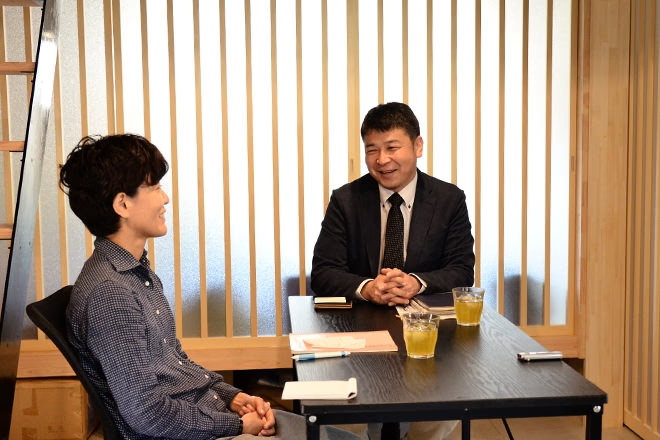
永井
じゃあ、定住対策班は意外に最近なんですね。
西村
ちょうど永井さんが周防大島に来たくらいからです。町長が定住対策にもっと力を入れようと定住対策班を作りました。
永井
移住じゃなくて、定住というところがポイントですか?
西村
そこに役場の想いは込められていますが、自分としてはそんなに縛られるつもりはなく、「移住担当です」というスタンスで表現しています。
永井
東京での移住説明会での西村さんの説明や移住希望者一人ひとりへの対応を見ていたうちのスタッフが、「本当に熱心ですよね」と感心していたんですね。実際、私も西村さんには本当に良くしてもらっていて。異動したから定住担当という感じを超えた仕事ぶりの原動力はどのあたりにあるんですか?
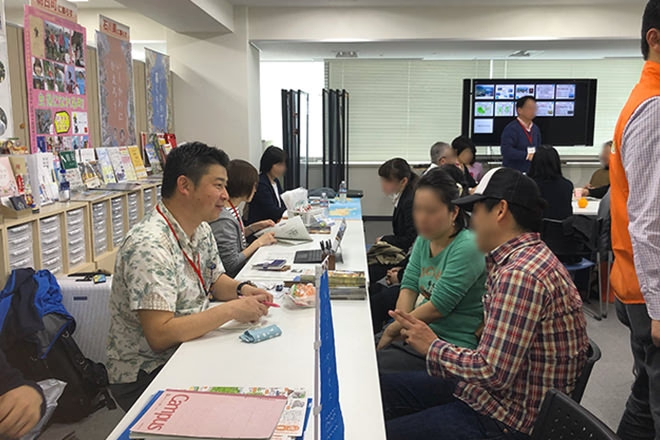
有楽町で開催された山口県への移住相談イベントで相談を受ける西村さん(左)。移住を検討し、何度かイベントに訪れている参加者には「西村さん」と名前を呼びかけられ、ひっきりなしに相談されていました。
西村
人対人ですから。永井さんにしても、他の移住者の方にしても、自分が周防大島への移住の窓口となって説明をしているので、その人たちに対する責任は感じますから。まあ、責任とまで言ったら重たいけど、なんでも相談してもらえる態勢を取りたいですし、コミュニケーションを深めてもいきたいです。
永井
移住、定住はある意味、その人の人生を左右するわけですもんね。
西村
永井さんの場合は、生まれ育った「大島に帰るよ」と言って帰ってきてくれたことに加え、モノサスのサテライトオフィスを開所するに当たって周防大島町のプランを活用してもらうという要素もありました。でも、普通に東京や大阪などから「移住してみたい」と悩んでいる人の相談を受ける場合、自分の立場としては相手を周防大島に引き込む側になるわけです。
当然、その人の人生をぐるりと変えることになるので、責任重大で時には「恐ろしい」と思うこともありますよ。だから、定住の相談会で話をするときは、あえて周防大島で暮らすときのマイナス面のことから話すようにしています。
永井
たしかに、そうですね。聞いている方が、「そんなに並べていいの?」と思うくらい正直でした。
西村
正直でもありつつ、1つの作戦でもあって。他の地域の人たちは「うちはこんなにいい地域す」ってことでアピールして、「だから来てくださいね」と締めくくるんですね。
でも、それは誰でも話せることで、あえてマイナスに足を突っ込んじゃった方が「周防大島っていいところばかりを話すわけじゃないんだな」と興味を持ってもらえるかな、と。
永井
たしかに、包み隠さず教えてくれる方が、「こんなはずじゃなかった」とならないですよね。
西村
説明会にお越しになって「移住しようか悩んでいるんです」と言っていた方が、後日メールで「周防大島のことを正直に教えてもらってありがとうございました」という感想をくださることもあるので。間違ってはいないかなと思っています。
永井
やっぱり話したことに反応があって、1人でも2人でも周防大島に来る人が増えるときにやりがいを感じます?
西村
単純にうれしいですよね。最近で言うと、去年の11月に大阪の移住・定住フェアへ行ったんですよ。その前に「大阪からUターンしたいんです」と20歳過ぎの若い子から役場に電話をもらっていて、「今度、大阪でフェアがあるから、遊びにおいで」と言ったら来てくれて。
彼は大阪にある高層ビルの管理の仕事をしていたんですね。それで、「この仕事は周防大島にないですよね?」と聞かれて、周防大島にはビルがないけえ「ないよ」と。だけど、それでおしまいにはできんでしょう。
だから、うちにはないけど、周防大島じゃなくても山口県に帰ってきてくれたらうれしいなと思って、フェアで隣にいた周南市の担当者に「ない?」と聞き、「うちもあんまりないの」「じゃあ、隣の下松市はどうかな?」と。
そんなふうに山口県内でバトンタッチしていったら、移住希望者の彼はすごく親身になってくれたと思ってくれたみたいで、その後も連絡を取り合う関係になったんですよ。
永井
その後、どうなったんですか?
西村
結局、県内のとある通信関係の会社が求人しよるという話をちらっと聞いたので、そこに電話をして「大阪でこういう仕事をしている若者がおるんじゃけど」と伝えたら、「うちも社員を募集していますので」と資料をくれたんですね。
それを彼に転送したら、「受けてみたいです」と。この正月明けに面接を受け、内定が出て、3月に帰ってきました。
そしたら、20歳過ぎの男の子が手土産まで持って役場まで挨拶に来てくれて。戻ってきてくれたことがうれしいんじゃけえ、逆にこっちがご挨拶に行かにゃいけんのに。これが最近、一番うれしかったことですね。やっぱり相談してくれてた方が、転入してくれるとやりがいを感じます。
永井
周防大島じゃなくても、山口県でもうれしいんですね。
西村
その方が彼らの選択肢の幅も広がりますから。それに、「あのとき周防大島の人に親身になってもらったな」という印象が残れば、それだけでもプラスになるんかなと思います。
「都会はちょっと外に出るにもちゃんとした服を着んといけんでしょう」
島の定住担当者自身がUターン就職を決めた理由
永井
西村さん自身は周防大島から出ての生活の経験はあるんですか?
西村
高校を出た後、1年間広島におって、大学では4年間福岡で暮らしていました。
永井
広島の1年は、どんな期間なんですか?
西村
学生浪人みたいな感じというか、高校を出て広島のとある専門学校に行ったんですね。2年コースじゃったんですが、なんか違うな、と。1年で辞めてしまって。冬に福岡の大学を受験し直したら、引っかかって、オヤジに「行ってええ?」と聞いたら、「行きたいなら行け」と言ってくれて。ただ、その分、大学4年間、夏休みは強制労働が続きました。
永井
ご実家、漁師さんでしたよね?
西村
ちょうど大学の夏休みの時期は、イワシ漁の最盛期なんですよ。だから、死ぬほど実家で働きましたね。朝6時に起きて、沖へ行って、戻ってきて、昼は氷屋に氷を取りに行き、午後からまた沖へ行き20時まで。
永井
じゃあ、1年間広島で、4年間福岡で、その後、周防大島に?
西村
はい。Uターンしよう、こっちで働こうと心に決めたのが、大学の2、3年のときかな。理由はものぐさなんですけど、福岡だとちょっと外に出るんでもちゃんと服を着んといけんでしょ。
永井
大島で暮らし始めて1年ちょっと、その気持ち、わかります。
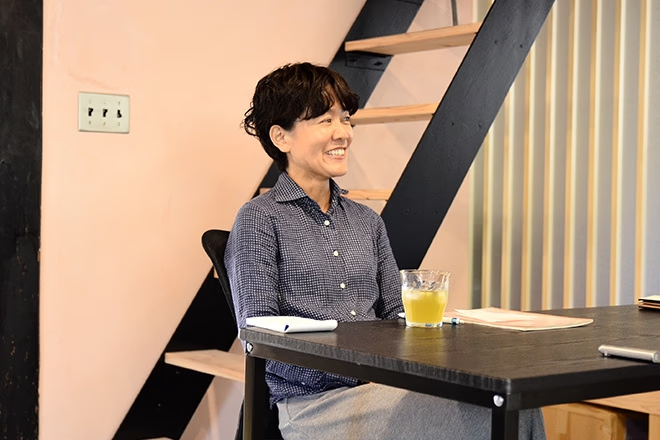
西村
若い頃、うちの実家はエアコンが1台か2台しかなかったから、暑いと思ったらパンツ一丁で海辺に出て、夜風に当たってました。そこに、近所のおばあちゃんが通りかかっても、「あんた、涼しそうじゃね」でおしまい。当時は自分もまだ痩せちょったし。
永井
福岡のどこにおったかもあるでしょうけど、街中じゃパンツ一丁は無理ですね。
西村
そうそう。で、役場の募集があったので受験したら受かったので、帰ろうか、と。
永井
じゃあ、わりと自然に戻ってきた感じですね。
西村
だから、最初は他所が見えていなかったんですよ。しかも、平成大合併の前は金魚の尻尾(周防大島は島の形が金魚に見えることから)の旧東和町という狭い地域で働いていて、当時は県庁に電話することすら恐れ多いことじゃったんですよ。
「これって聞いてもええん?」みたいな。今では困ったら、「ちょっと電話で聞いちゃれ!」という感じで、県の移住担当者ともツーとカーですよ。
人との出会いが自分の殻を破った
多面的に考えられるようになって変化した定住希望者とのやりとり
西村
今日は「ものさすサイト」の取材で、自分なりの「ものさし」っちゅう話を聞かれるのかなと思って、ちょっと自分なりに仕事を振り返ってみたんですよ。
永井
ありがとうございます。
西村
やっぱり人生の途中で自分の「ものさし」は変わっていくもんですね。
最初の転換期は就職のとき。役場という組織の中に入って自分の価値観が変わりましたし、その後は市町村合併。平成16年に久賀町、大島町、東和町、橘町の大島四町が合併して、周防大島町になったんですけど、よその町の職員さんたちと話すことによって、旧東和町という自分の「ものさし」も変わっていきました。
ただ、一番大きく変わったなと思う出来事は2つあって、1つは平成21年に東京で開催される研修に行かせてもらったことです。
永井
研修ですか?
西村
「地域づくり」がテーマの研修で10ヶ月連続で月に1回、3日間ほど東京に行き、全国の市町村の職員さんと一緒に中央で起こっていることを学んできたんです。それで、自分の考えの幅がぐんと変わっていきましたね。
永井
具体的にどういうところが変わったんですか?
西村
井の中の蛙が井戸から出られたって感じでした。
全国研修に行かせてもらったことで、まずは中央の仕組みがわかりました。世の中の流れ、行政の施策がどういうふうに決まっていくのかがわかったことで、自分らの抱えている問題の解決方法も見えてきたわけです。
困ったことがあれば、どこに相談すればいいっていうのも見えてきましたし、それを後押ししてくれる同じ研修生の仲間も全国あちこちにできました。
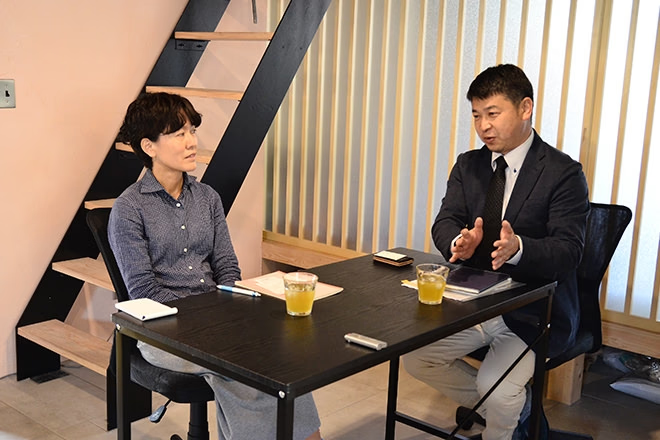
また、政府の第三者機関で物を言う大学の教授や識者の人たちにも知り合いができたので、そういったつながりは今も大事にしていますね。
とにかく自分の殻を破るのにいいきっかけをもらったと思います。それまでは周防大島町内の現場を動き回ることはできていたけど、世の中のことを知らんかったんです。
永井
もう1つは?
西村
大阪のおっちゃんとの出会いですね。
永井
大阪のおっちゃんですか?
西村
周防大島出身、大阪で努力して、努力して、会社を起こし、成功した方です。大阪の周防大島町人会の幹部をされていたとき、役場に電話があって、たまたま担当者が不在だったので私が1時間くらいしゃべったんです。
そのとき、真っ先に言われたのが、「おまえダメな理由しか探しよらんの」「役場っていうのは、ほんと、できん理由、やれん理由を口にするのが悪いところよ」と。初対面でドーンと言われて、何も言えんかったですね。
ただ、その日以来、覚えてもらえて事あるごとに「西村、元気か?」と電話をくださって。その後、周防大島にUターンしていただきました。
永井
いい関係なんですね。
西村
今も何か考えに困ったら、「困っちょるんですけど、話を聞いてもらっていいですか?」と電話しています。すると、ヒントはくれますが、答えはくれませんけど。
この2つの出来事で、物の見方が変わりましたね。
以前は正面しか見れなかったのが、今は横、斜めとなって。移住者が「こうしたい」と言ったとき、この人はどんなニーズを求めているのかってことを自分で考えるようにもなって、「この人の場合は就職から攻めた方がええんかな」とか。「この人は田舎に来たら失敗するタイプじゃから、やんわりと断った方がええ」とか。多面的に物を見られることが対応へのゆとりにもつながってきたと思います。
永井
田舎に来たら失敗するタイプってあるんですね。
西村
移住、定住は人生を大きく変えますから、「この人は地域に溶け込めるんかな?」という見方はします。例えば、役場に来きてくれた定住希望の女性と1時間半話して、喧嘩みたいになったこともあります。
「あなたはね、ダメなところしか言わない。あなた定住対策班でしょう?やる気あるの?」「あなたじゃ話にならないわ、上の人を呼びなさい」と。
永井
それは、やんわり断っているということですか?
西村
少し違うんです。
ただ、そこでけんか別れしたら、クレームでしかないので。そっからが勝負ですよね。こんこんと「とにかく、今、お客様が言われちょったのが、将来、定住したときの成功につながるかと言うたら、自分はそう思わんかっんので、お客様に注意していただきたい点を言うたんですよ」と。
これは周防大島に決して来てほしくないから言っているわけじゃなくて、引っ越してきて1週間後に「私はこんな生活を想定していなかった」と思われたら、誰も幸せになりませんから。
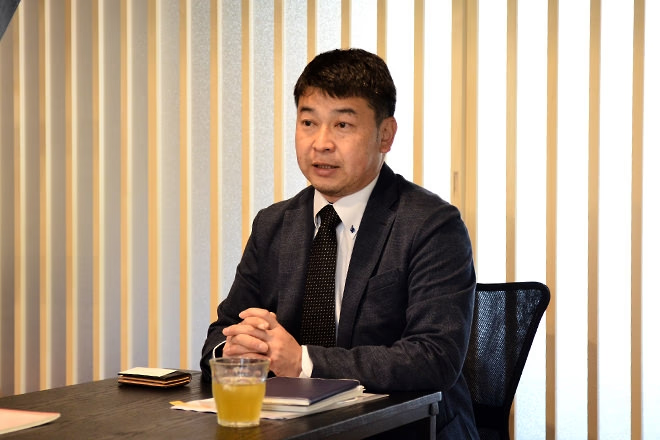
ご近所にも、「今度、こんな人が移住してきてくれるんで、お願いしますね」と伝えています。その人が移住して1ヶ月後に出ていくとなったら近所の方も「せっかく来てくれたのに……」と残念に思います。もちろん、自分ががっかりですし。
永井
たしかに地元でも「来てくれる」というウキウキ感ありますもんね。
西村
「ようきてくれたのう」って雰囲気になりますから。だけど、1カ月で移住がうまくいかないという結果になってしまったら、期待を持ってくれた人たちをがっかりさせてしまうことになります。
がっかりっていうのは、今までのレベルよりも落ちる状態で。移住、定住に対するイメージもマイナスになり、そこからまた地域が衰退していくという流れにもなりますからね。
永井
「やっぱりダメじゃったか」と。
西村
昔の自分なら移住、定住の担当者として数を追いかけて、誰でも彼でも受け入れようと考えていたかもしれないです。
でも、そもそも移住、定住をなんのためにやるのかと言えば、地域を守るためですから。だから、今いる地域の人たちをがっかりさせてしまったら、自分らの仕事のやる意味がないんですよね。そういう思いでやっています。
永井
ちなみに、「この人は無理そうだな」って人には共通点があるんですか?
西村
話せば考え方を変えてくれる人がほとんどですが、とにかく家から入るパターンですね。こんな家に住んでみたい。こんな場所に住んでみたい、と。
そこがどんな地域か知ろうとしないんですよね。とにかく「家だけ見たい」という人の描いている定住は、都会の暮らしをそのまま周防大島に持ってくるイメージです。ご近所付き合いも、地域の寄り合いも、清掃活動も、私には関係ないから、と。
でも、自分たちがしている仕事は移住者、定住者が地域と溶け込んでいくためのお手伝いなので。それをまったく求めてない人を招いても、周防大島のためにはならないという思いでやっていますね。
お世話になっちょった人たちを見送っていきたい
網元の家で育った1人の地域住人として思うこと
永井
島で育った子供時代は、どんな感じだったんですか?
西村
人から言わせれば、ぼっちゃん。3人姉弟で、姉、姉、自分だったんですよ。イワシ網漁の網元の家に生まれた待望の男の子ですから、まわりからは「ぼっちゃんのような生活をしよったのう」と言われます。
永井
漁師になろうとは?
西村
絶対、思わんかったですよね。船に酔うんですから。また、うちのオヤジにも漁師になって欲しいという気持ちはなかったと思いますし、なれとも1回も言われたことがないですから。
むしろ、結婚したときから住んでいる沖家室から「おまえ、出るんじゃないんか? 引っ越さんのか?」と言われたことがあるくらい。周防大島のなかでももっと便利な方に行った方がええよ、と。
だけど、「ワシは出るつもりないよ」と答えました。
永井
たしか、西村さんの家から役場まで車で45分くらいかかるんですよね。それって都心なみの通勤時間で、お父さんの言うこともわかります。それでもこの地域にこだわるのは、どうしてなんですか?
西村
人間性ですかね。同じ周防大島の中でも、自分の住んでいる沖家室や永井さんのいる地家室のようなど田舎……ごめんなさい(笑)と、本州とつながる大島大橋に近いまちではなんか違うんですよね。
自分はやっぱり隣近所、昔から知っちょる人の中におる方が楽ですし、その人たちを看取っていかにゃいけんと思っています。
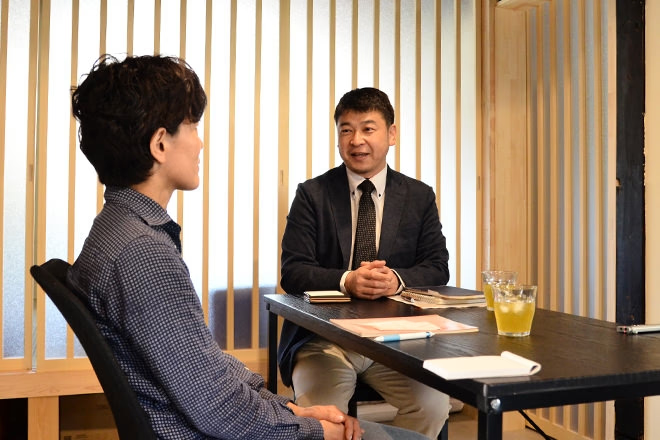
永井
親ではないですけど、子供の頃から自分を見守ってくれていた人たちを看取っていきたい?
西村
そうですね。それは役場の人間としてではなく、自分が日ごろお世話になっている地域の住人として。お世話になっちょった人が亡くなって、「死んだよ」と聞くと「おばちゃん死んだんじゃねー」と。お悔やみに行って、顔を見せてもらって、「おばちゃん、優しい顔しちょるねー」と。
子供の頃は怖くて亡くなった方の顔を見れんかったけど、慣れました。死に慣れると言ったらおかしいですけど、そうやって先に逝く人たちを見送っていきたいんですよ。
